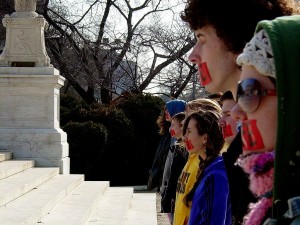It Could Happen Here: Paraguay’s Draconian Abortion Laws and the U.S.’s Slippery Slope
 A pro-life group is symbolically gagged during a vigil in front of the Supreme Court in Washington DC. Photo by Ben Schumin.
A pro-life group is symbolically gagged during a vigil in front of the Supreme Court in Washington DC. Photo by Ben Schumin. Imagine how you would feel if the course of your life dramatically altered in one single instant. Your dreams and plans for yourself suddenly became impossible, and your chances of success, already slim, instantly disappeared.
But imagine that someone could offer you a way to restore your dreams. Your life would still never be the same again, but you could have an opportunity to carry out your old plans and even succeed at them. You’d probably start to feel hopeful again, maybe even excited at the possibilities that life held for you.
Now imagine that someone denied you the chance you had at reestablishing your life simply because of religion.
For a ten-year-old girl in Paraguay, this imaginary exercise is painfully real. The child, who remains unnamed in the news, was taken to the hospital last month after she experienced stomach pain. She and her mother discovered that she was five months pregnant as a result of being raped by her stepfather. The girl’s mother and her doctors stressed the need for her to have an abortion. After all, how can a ten-year-old be expected to carry, give birth to, and raise a child when she is still only a child herself?
The government of Paraguay, however, thinks that she can. While many humanists rightfully bemoan the erosion of reproductive rights in the United States, in Paraguay, the laws are even more draconian. Abortion is completely banned, even in cases of rape and incest, and is only permissible if the woman’s, or in this case girl’s, life is clearly in danger. Despite the many health risks to young girls who become pregnant, including obstetric fistula and even death, Paraguay’s government insisted that this child continue her pregnancy.
Unsurprisingly, the Catholic Church’s strong influence on Latin America is at least partly to blame for this callous dismissal of a child’s suffering. Archbishop Monsignor Edmundo Valenzuela, head of the Paraguyan Catholic Church, claimed that the United Nations is promoting a “culture of death” by urging the government to permit the girl to get an abortion. However, one could just as easily argue that the culture that refuses to allow an innocent ten-year-old to move on with her life and attempt to heal from the trauma of being raped is the real “culture of death.”
If there is any silver lining in this sordid situation, it’s that national attention is being focused on the problem of sexual abuse in Central and South America. Shelter workers report that pregnant preteen and teen girls are, sadly, not unheard of, and they also point out that for every case of a girl who is raped and reports the crime, there are likely thousands of girls who are suffering just as much.
While the world waits to see what will happen to the girl in Paraguay, the US House of Representatives has passed a bill that would ban abortions after twenty weeks. The bill relies on the dubious claims that fetuses are capable of feeling and comprehending pain after twenty weeks of gestation. Regardless of whether the bill will eventually become law, it represents the disturbing efforts of the religious right to rollback women’s reproductive freedoms. While many politicians probably wouldn’t openly endorse Paraguay’s strict abortion bans, there are plenty of anti-abortion groups in the US that clearly state their goal of ending legalized abortion in this country.
The lives of women and girls are too important to be ignored by politicians who are more interested in the opinions of churches and religious special interest groups. Unless the government in Paraguay listens to the United Nations and other advocates such as Amnesty International, an innocent ten-year-old will have her childhood snatched from her. No girl or woman, whether in Paraguay or in the US, should be forced to carry her rapist’s fetus. In fact, no girl or woman should be required to undergo a pregnancy that she does not want, for any reason. Girls and women deserve autonomy over their own bodies. They deserve to make decisions about their lives and their health for themselves. But obviously those ideas sound too much like feminism and humanism for Catholic leaders and religious right politicians.
